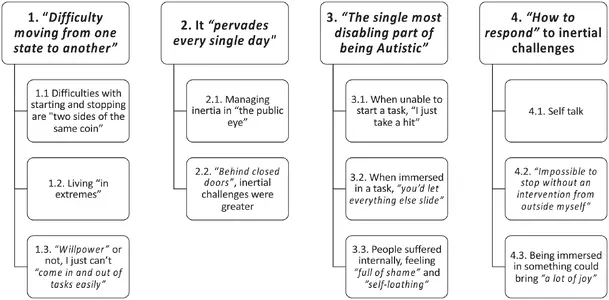Reading over the Wikipedia article on autism spectrum disorder I encountered the phrase autistic inertia. It sounded like a somewhat more precise term for executive dysfunction which I am sure most of the readership is familiar with.
The lay abstract is as follows:
‘Autistic inertia’ is a term used by Autistic people to refer to difficulties with starting and stopping tasks. However, there has not been much research on Autistic inertia. The research that is available on Autistic inertia has mostly focused on the negative aspects of inertia, rather than on the possible benefits of needing to continue tasks. In this research, we wanted to understand more about Autistic people’s experiences of inertia and to work out what things might influence these experiences. Autistic and non-Autistic researchers spoke in-depth to 24 Autistic adults. We identified four key ideas from people’s responses. Autistic people spoke about their inertial ‘difficulties moving from one state to another’ and described how these challenges affected them ‘every single day’. While they experienced inertia as ‘the single most disabling part of being Autistic’, people also described the positive aspects of inertia, including the joy they felt when completely immersed in a task. Our Autistic participants emphasised that inertial difficulties are experienced by everyone, the intensity of these task-switching difficulties might be especially challenging for Autistic people. Our findings also reveal how Autistic inertia can be seen both as a disabling and as an enabling condition.
Here is the link I used to access the article:
https://journals.sagepub.com/doi/10.1177/13623613231198916
And there is an awfully relatable graph here: the shame, self-loathing, and whatnot are pretty close to my daily experience. I agree with the comment in the general premise of this article that (at least for ASD-1) this might be the single most disabling part of being autistic. Pushing through without triggering a shutdown or more 'tism problems is the hard part; I have no viable strategies to cope with this like a functioning human being so instead I don't. I have willpower. I can function. Give me something to do and I will set a hand to it until it is done, but why in the world do I also freeze up and stop so badly?

Rapaport, H., Clapham, H., Adams, J., Lawson, W., Porayska-Pomsta, K., & Pellicano, E. (2023). ‘I live in extremes’: A qualitative investigation of Autistic adults’ experiences of inertial rest and motion. Autism, 28(5), 1305-1315. https://doi.org/10.1177/13623613231198916 (Original work published 2024)The lay abstract is as follows:
‘Autistic inertia’ is a term used by Autistic people to refer to difficulties with starting and stopping tasks. However, there has not been much research on Autistic inertia. The research that is available on Autistic inertia has mostly focused on the negative aspects of inertia, rather than on the possible benefits of needing to continue tasks. In this research, we wanted to understand more about Autistic people’s experiences of inertia and to work out what things might influence these experiences. Autistic and non-Autistic researchers spoke in-depth to 24 Autistic adults. We identified four key ideas from people’s responses. Autistic people spoke about their inertial ‘difficulties moving from one state to another’ and described how these challenges affected them ‘every single day’. While they experienced inertia as ‘the single most disabling part of being Autistic’, people also described the positive aspects of inertia, including the joy they felt when completely immersed in a task. Our Autistic participants emphasised that inertial difficulties are experienced by everyone, the intensity of these task-switching difficulties might be especially challenging for Autistic people. Our findings also reveal how Autistic inertia can be seen both as a disabling and as an enabling condition.
Here is the link I used to access the article:
https://journals.sagepub.com/doi/10.1177/13623613231198916
And there is an awfully relatable graph here: the shame, self-loathing, and whatnot are pretty close to my daily experience. I agree with the comment in the general premise of this article that (at least for ASD-1) this might be the single most disabling part of being autistic. Pushing through without triggering a shutdown or more 'tism problems is the hard part; I have no viable strategies to cope with this like a functioning human being so instead I don't. I have willpower. I can function. Give me something to do and I will set a hand to it until it is done, but why in the world do I also freeze up and stop so badly?
